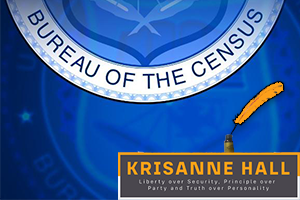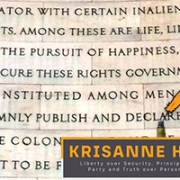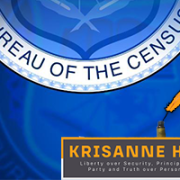American Community Survey- Not a Census, Overly Intrusive, Absolutely Unconstitutional
by KrisAnne Hall, JD
There have been many questions about the legitimacy of the extremely intrusive questions on the current and recurring American Community Survey. The only thing more intrusive and obnoxious than the questions on this survey are the “agents” sent to harass and harangue you into answering them. Let us be very clear… THIS IS NOT A CENSUS.
The purpose and mechanism of the census is to numbers of people alone and not property…at all. There is no delegated authority for the federal government to ask you any of the vast number of questions on these surveys other than HOW MANY citizen live in your home. Any other question is completely unauthorized, unconstitutional, and as Alexander Hamilton stated, “void and invalid.”
Since the federal government and the courts are aligned against these principles, there is no protection that can be expected from the intentions of an overreaching government. The only true limitation and check on governmental power is the people. “That to secure these rights, Governments are instituted among Men, deriving their just powers from the consent of the governed.” (Declaration of Independence) We have the right and authority to say we will not allow the transgressing of our rights. We have the power and the right to say, NO! We will not comply. Our State and local governments should be protecting their citizens from this unconstitutional and unlawful intrustion into our privacy and property. (Check out the book “Sovereign Duty” if you would like a better understanding of the authority to say “No!”)
Would you like some practical (not legal) advice? Do what my husband did when they came to our house with this illegal & unconsitutional nonsense. When the surveyor asked the Community Survey questions, his answer was simply, “None of your business.” After a few questions answered in this manner, the woman asked my husband, “Is it safe to assume that you will not be answering any of the rest of my questions?” My husband matter of factly replied, “Ma’am, I have answered all of your questions. My answer to the rest will likely be ‘None of your business’ because the Constitution does not require me to answer these questions, therefore these questions are illegal. Just because your computer does not give you to the option to choose “None of your business” as an answer, does not mean that it is not an answer.” This interaction let into a lesson on the purpose and authority of a Census and the Constitution and the surveyor left enlightened, and surprisingly happy to have been so educated.
Watch the Short & Powerful Documentary, NonCompliant and learn more about Your Power and the Duty of the State & Local governments to PROTECT your Rights!
If you would like to KNOW & Understand your authority to TRESPASS the Community Survey agents off your property, Read the article Your Power to Trespass (Even Government Agents)
I have prepared a brief summary of the purpose of the census, not according to my opinion, but those that drafted, debated, and ratified Article 1 Section 2 Clause 3 of the Constitution. I hope this will help us to understand how unconstitutional these American Community Survey questions really are.
What is a Census & Why do we have one every Ten Years?

Understanding the purpose of the census is fundamental to understanding its limitations. The purpose of the census was two-fold;
- Determine the number of federal representatives in the house
- Set the portion of federal expenses to be apportioned to each State based upon population.
Neither of these things is to be determined by property, but by numbers of persons alone. The reason for the census was to keep the federal government from arbitrarily laying taxes and apportioning unequal suffrage to the states and to keep the States from lying about their population to get greater representation in the House or to share an unequal portion of the national expenses. It is a count of the number of citizens in each State. That is why citizens along and not non-citizens are subject to the Census via the Constitution. An alien (legal or illegal) has no share in the payment of the national debt and no representation in Congress. Aliens of all types, constitutionally speaking, ought to be legally prohibited from participating in the census. It was set up to be a double check and balance for the ultimate protection of the rights and property of the people. Alexander Hamilton wrote in Federalist #36:
“Let it be recollected, that the proportion of these taxes is not to be left to the discretion of the national Legislature: but is to be determined by the numbers of each State as described in the second section of the first article. An actual census or enumeration of the people must furnish the rule; a circumstance which effectually shuts the door to partiality or oppression. The abuse of this power of taxation seems to have been provided against with guarded circumspection. In addition to the precaution just mentioned, there is a provision that all duties, imposts and excises shall be UNIFORM throughout the United States.”
James Madison makes it clear in Federalist Paper 54 that it is the “fundamental principle of the proposed Constitution, that as the aggregate number of representatives allotted to the several States, is to be determined by a federal rule founded on the aggregate number of inhabitants… who will be included in the census by which the Federal Constitution apportions the representatives. We have hitherto proceeded on the idea that representation related to persons only, and not at all to property.
Therefore the purpose and mechanism of the census is to numbers of people alone and not property…at all.
The Irony of the hypocrisy of the federal government is the current expansion of federal power through the community survey compared to the fact that current practice of Congress and the 16th Amendment have most literally negated the entire purpose the Census was created in the first place. In 1929, through the Reapportionment Act, Congress decided they would no longer assign district representatives according to the census population but cap the number of representatives at 435. If the number of House Reps is not going to be determined by the number of people anymore, then half of the purpose of the Census is gone. The 16th Amendment destroyed the second reason for the census. States are no longer assigned a portion of the national expenses because now the federal government reaches into our individual pockets through direct taxation, a principle the designers of our Constitution found despotic at best.
Not only is the created purpose of the census currently negated, our current census does a whole lot more than count numbers of people, it counts property as well. If the framers of the nation said that property is NOT the subject of the census, on what authority can the government include this in the current census? The logical answer is that they cannot. They only mechanism that allows them to do this is what our framers called a “forced construction” of the Constitution.
If you go to the government’s website on the census they will assure you that the current census is lawful because the courts say so. However, that is not the standard our founders laid as the test to legitimacy. Our founders said the Constitution, not the will of the government, is the only true judge of the government’s power. Let’s look at the government’s reasoning as it compares to the drafters’ limitations on government.
Government: In 1954, Congress codified earlier census acts and all other statutes authorizing the decennial census as Title 13, U.S. Code. Title 13, U.S. Code, does not specify which subjects or questions are to be included in the decennial census. However, it does require the Census Bureau to notify Congress of general census subjects to be addressed 3 years before the decennial census and the actual questions to be asked 2 years before the decennial census.
Founders: Let it be recollected, that the proportion of these taxes is not to be left to the discretion of the national Legislature: but is to be determined by the numbers of each State as described in the second section of the first article. An actual census or enumeration of the people must furnish the rule; Alexander Hamilton, Fed. Papers #36
Government: The Legal Tender Cases, Tex.1870; 12 Wall., U.S., 457, 536, 20 L.Ed. 287. In 1901, a District Court said the Constitution’s census clause (Art. 1, Sec. 2, Clause 3) is not limited to a headcount of the population and “does not prohibit the gathering of other statistics.”
Founders: “If the decision of the judiciary be raised above the authority of the [states]… dangerous powers, not delegated, may not only be usurped and executed by the other departments, but that the judicial department, also, may exercise or sanction dangerous powers beyond the grant of the Constitution… James Madison, Virginia Assembly Report of 1800
“No legislative act, therefore, contrary to the Constitution, can be valid. To deny this, would be to affirm, that the deputy is greater than his principal; that the servant is above his master; that the representatives of the people are superior to the people themselves; that men acting by virtue of powers, may do not only what their powers do not authorize, but what they forbid.” Alexander Hamilton Federalist Paper #78
Government: The census does not violate the Fourth Amendment. Morales v. Daley, 116 F. Supp. 2d 801, 820 (S.D. Tex. 2000). In concluding that there was no basis for holding Census 2000 unconstitutional, the District Court in Morales ruled that the 2000 Census and the 2000 Census questions did not violate the Fourth Amendment or other constitutional provisions as alleged by plaintiffs. (The Morales court said responses to census questions are not a violation of a citizen’s right to privacy or speech.)
Founders: When told the government had the right to search the colonists property to ensure compliance with the taxes through the mechanism of writs of assistance, James Otis Jr told the court that this power “appears to me the worst instrument of arbitrary power, the most destructive of English liberty and the fundamental principles of law, that ever was found in an English law-book.”
The federal government does not have the authority to assume a power simply because it is not forbidden. To argue that the “Constitution doesn’t say we can’t do it” is the height of Constitutional heresy! The powers delegated to the federal government are enumerated. If a power is not part of that enumeration it is not a power that belongs to the federal government but to the States! To claim otherwise is theft of State power.
The powers not delegated to the United States by the Constitution, nor prohibited by it to the States, are reserved to the States respectively, or to the people. (10th Amendment)
A Republican Federalist in paper No. 5 stated that “the provision in the system for a representation of the people, which is the corner stone of a free government.” If creating a census was a mechanism to protect the “corner stone of a free government” surely our framers would not have authorized the federal government to engage in principles contrary to that cause though the use of that very mechanism.
The government’s attempt to place property into the community survey and then claim answering the questions is required by law, appears to me to be a mechanism to collect information regarding our personal property with the purpose to tax it in the future.
Sounds like the Feds are licking their chops at the possibility of taxing the people into another government revenue stream. Exercise your authority to say, NO!
Watch the Short & Powerful Documentary, NonCompliant and learn more about Your Power and the Duty of the State & Local governments to PROTECT your Rights!
If you would like to KNOW & Understand your authority to TRESPASS the Community Survey agents off your property, Read the article Your Power to Trespass (Even Government Agents)












